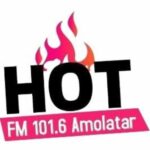
 Hot FM
Hot FM

 Hot FM
Hot FM
21 November 2025, 3:56 pm

By Sarah Ejang
In a compelling statement that resonates with the realities faced by countless individuals in Amolatar, Ms. Ayo Molly, the Environment Officer for the district, has sounded the alarm on the escalating effects of climate change.
This alarming situation is exacerbated by human activities such as wetland encroachment and deforestation, emphasizing the urgent need for collective action.
The significance of this warning cannot be overstated.
Ms. Ayo pointed out that while “climate change” has become a buzzword in discussions worldwide, its impacts are acutely felt at the local level.
Recent floods ravaging Amolatar serve as a stark reminder of the crisis, while prolonged droughts and extreme heat waves during dry seasons further underscore the unpredictable weather patterns that have emerged in recent years.
Ms. Ayo argues that climate change is not merely a natural phenomenon, but a crisis significantly intensified by human activity.
The rise in global temperatures, she explained, is transforming weather behaviors across the globe, leading to dire consequences in Uganda, particularly in Amolatar where rising water levels and intense rainfall have resulted in catastrophic flooding.
The ramifications of these changes are far-reaching. Reports from nearly every sub-county in Amolatar depict a landscape devastated by climate-related disasters.
Families are displaced, agricultural lands lie submerged, and essential livelihoods are under threat. The challenges posed by these shifts are formidable, necessitating urgent and comprehensive responses that, presently, seem insufficient.
Ms. Ayo advocates for integrating interventions that will enhance the resilience of farmers, local institutions, and infrastructure to withstand the brunt of climate change impacts.
Ms. Ayo emphasizes the importance of equipping farmers with knowledge regarding potential flood risks and adaptive strategies. “We must understand how high the water levels can rise and what measures we can take,” she stated. In areas where proactive strategies, like terracing and drainage channel construction, have been employed, there is notable evidence of improved water management and better crop protection.

As the communities of Amolatar grapple with these daunting issues, Ms. Ayo underscores the need for enhanced technical knowledge and capacity building.
Collective action, paired with heightened environmental awareness and responsibility, is essential to engender meaningful change.
The urgency of responding to climate change has never been more paramount, calling on all stakeholders—from government officials and NGOs to community members—to unite for the future resilience of Amolatar.
Amidst these pressing concerns, personal stories illuminate the human impact of the climate crisis. Cissy Okello Simon, a resident of Amolatar Town Council, shared a heart-wrenching account of the devastating floods that have submerged homes and obliterated livelihoods.
With nowhere to seek shelter, Cissy and many others are forced to confront the nightmare of displacement brought on by relentless waters.
The devastation extends beyond mere displacement; crops in gardens have suffered extensive damage, raising significant concerns about food security in a region already vulnerable to such crises.
Surveys conducted in Inomo Ward reflect a grim reality: most homes have been severely affected by flooding, a plight echoed across various sub-counties such as Nalibwoyo, Aputi, Etam Town Council, Acii, and Namasale.
Additionally, entire communities, including Amai A Village and Amai B Village in Aputi Sub-county, have found themselves completely submerged, forcing residents to seek refuge at Ading Trading Centre and Be Iwe Trading Centre.
The impact of the flooding is compounded by deteriorating infrastructure; transportation routes, such as the Odyak-Namasale road, are reported to be in poor condition, further complicating the delivery of aid and resources to those in need.
The affected communities are in urgent need of immediate assistance and support to navigate this unprecedented crisis.
As Ms. Ayo stresses and as residents like Cissy illustrate, it is imperative that we act now—together—to mitigate the effects of climate change and secure a sustainable future for Amolatar.
Our collective response will ultimately determine the resilience and recovery of our communities in the face of this ongoing crisis.